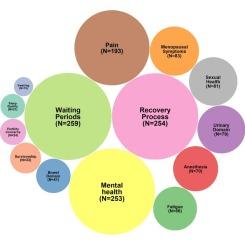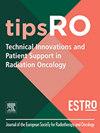基于人工智能的宫颈近距离治疗相关在线讨论情绪分析
IF 2.8
Q1 Nursing
Technical Innovations and Patient Support in Radiation Oncology
Pub Date : 2025-09-02
DOI:10.1016/j.tipsro.2025.100340
引用次数: 0
摘要
目的/目的:很少有研究记录了接受宫颈近距离放疗的患者的经历。虽然关于这一人群生活质量问题的证据已经出现,但传统的结构化问卷调查往往无法捕捉到患者的全部观点。我们假设,分析来自在线论坛的未经过滤的患者讨论将揭示对患者体验的独特见解,包括以前未识别的情绪反应、担忧和应对策略。本研究应用人工智能(AI)工作流来分析在线论坛上关于宫颈癌和近距离治疗的讨论。材料/方法我们从reddit r/子宫颈癌版块中提取帖子和评论,重点关注2020年11月至2024年1月期间关于近距离放疗的讨论。我们应用了一个处理管道来准备用于分析的数据。使用RoBERTa(一种预先训练的深度学习模型)对内容进行分析,将情绪分为积极、消极或中性。我们进一步使用预定义的关键字标签来评估帖子,以确定基于最近文献的对话中的主导话题。结果分析包括来自1075个条目的初始数据集的898个独立帖子和评论。总体情绪为40.4%,29.9%为负面,29.7%为中性。在所有话题中,“肠域”的负面情绪比例最高(51.2%)。“泌尿系统”(46.8%)、“疼痛”(43.4%)、“疲劳”(42.4%)和“麻醉”(41.4%)的讨论也主要反映了负面情绪。相比之下,“康复”和“幸存者”的讨论主要是积极的。对“性”和“心理健康”相关话题的看法在积极和消极观点之间的分布更为平衡。结论:我们的研究证明了分析来自与颈椎近距离放疗相关的在线论坛的非结构化患者叙述的价值。我们确定了可以为临床实践提供信息的关注模式,特别是关于患者对肠道和泌尿系统副作用的教育。这些发现可以改善知情同意的讨论,并帮助临床医生更好地解决患者的重大问题。进一步的工作将集中在开发自动化系统,以弥合临床医生的理解和患者的生活经验之间的差距。本文章由计算机程序翻译,如有差异,请以英文原文为准。

AI based sentiment analysis of online discussions related to cervical brachytherapy
Purpose/Objective(s)
Few studies have documented the experiences of patients receiving cervical brachytherapy. While evidence regarding quality of life issues in this population has emerged, traditional structured questionnaires often fail to capture the full range of patient perspectives. We hypothesized that analyzing unfiltered patient discussions from online forums would reveal unique insights into patient experiences, including previously unidentified emotional responses, concerns, and coping strategies. This study applied an artificial intelligence (AI) workflow to analyze cervical cancer and brachytherapy discussions from an online forum.
Materials/Methods
We extracted posts and comments from the subreddit r/cervicalcancer, focusing on discussions about brachytherapy between November 2020 and January 2024. We applied a processing pipeline to prepare the data for analysis. The content was analyzed using RoBERTa, a pre-trained deep learning model, to categorize sentiments as positive, negative, or neutral. We further evaluated posts using pre-defined keyword tagging to identify dominant topics within conversations based on recent literature.
Results
The analysis encompassed 898 unique posts and comments from an initial dataset of 1075 entries. Overall sentiments were categorized as 40.4% positive, 29.9% negative, and 29.7% neutral. Discussions related to “Bowel Domain” showed the highest proportion of negative sentiments (51.2%) among all topics. “Urinary Domain” (46.8%), “Pain” (43.4%), “Fatigue” (42.4%), and “Anesthesia” (41.4%) discussions also reflected predominantly negative sentiments. In contrast, “Recovery” and “Survivorship” discussions were predominantly positive. The sentiments on “Sex” and “Mental Health” related topics displayed a more balanced distribution between positive and negative perspectives.
Conclusion
Our study demonstrates the value of analyzing unstructured patient narratives from online forums related to cervical brachytherapy. We identified patterns of concerns that can inform clinical practice, particularly regarding patient education about bowel and urinary side effects. These findings can improve informed consent discussions and help clinicians better address patients’ significant concerns. Further work will focus on developing automated systems to bridge the gap between clinicians’ understanding and patients’ lived experiences.
求助全文
通过发布文献求助,成功后即可免费获取论文全文。
去求助
来源期刊

Technical Innovations and Patient Support in Radiation Oncology
Nursing-Oncology (nursing)
CiteScore
4.10
自引率
0.00%
发文量
48
审稿时长
67 days
 求助内容:
求助内容: 应助结果提醒方式:
应助结果提醒方式:


